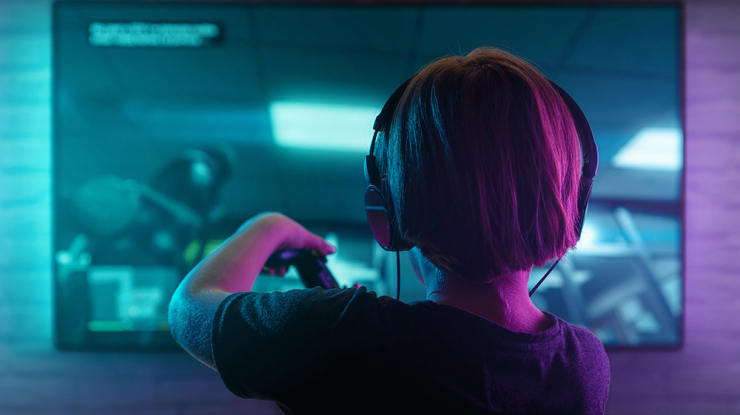Parents are often not well disposed towards computer games. The children dive out of family life into the world of games. Parents spend sleepless nights worrying about gaming addiction, radicalization, or sexual harassment, and agonize during the day over tough negotiations about their offspring's gaming times.

In the context of computer games, two terms keep popping up in the margins: Flow and Immersion. Both terms originate from psychology. Flow comes from "flow" and describes the balanced state between challenge and the increasing mastery of an activity on which one is focused.
Immersion refers to being immersed in a character, fantasy world, or imagination. Both states make the sense of time recede and create a counterbalance to everyday life. Both states are fulfilling and exhilarating in their own way. Games take advantage of this and so play time is extended. For the children, this means that in the worst case it can lead to problematic play behavior. Especially children with certain difficulties in emotion regulation or unfavorable compensation strategies of unpleasant feelings (for example, feelings of fear, loneliness, frustration, etc.) are at risk.
- forgets social appointments such as homework, dinner with the family, sports club, meeting girlfriends or friends
- does not go to bed as usual or already seems exhausted in the morning
- has difficulty concentrating or always wants to log on to online games
- reacts aggressively or extremely angrily when playtime is cut short (due to vacations or activities)
- has lost all interest in things he or she used to appreciate
It is essential to stay in touch with the children, even through difficult phases - even if it seems to fall on deaf ears. Computer games are a cultural technique that children should practice for a long time and with support in order to develop appropriate behavior.
- there is no end to the game - new play experiences are always offered without a final goal
- there is no end to the game - new play experiences are always offered without a final goal
- the game responds in a special way to the needs, wishes and abilities of the players and rewards them frequently and undeservedly
- belonging to a team promotes rapid progress in the game and the children receive a lot of appreciation and recognition. However, this also increases peer pressure.
- the game contains reward systems like loot boxes - either for money or for successful play. If the players "earn" a certain rank by investing money or time, this additionally binds them to the game.
Negative influences of media on children that are not age-appropriate may thus be limited, but not the possibility that adolescents will encounter sexual or extremist solicitations in the context of a game via other communication platforms. Accompanying children and adolescents in their experiences with computer games requires a lot of commitment and updates from parents. In addition to age labeling, guardians should therefore keep an eye on gaming contacts as well as streaming and video platforms.
- Set a good example: put your smartphone aside when you're having dinner together or talking to your child.
- Prevent access to sites with content not suitable for children (pornography, violent scenes). A parental control software like JusProg can help. With the software, parents can quickly, easily and free of charge ensure more safety when surfing on the computer.
- Always get an overview of what your child is doing while playing computer games and on the corresponding chat platforms.
Julia Karnicke's son is now an adult. He rarely spends time with computer games anymore and today honors his parents' educational efforts with the words: "I don't know what you could have done differently. I don't think anything..."
 In the video "Gaming - Where the fun stops", you can find out what the positive aspects of gaming are, but also how it can have a negative impact on our society.
Gaming - Where the fun stops
In the video "Gaming - Where the fun stops", you can find out what the positive aspects of gaming are, but also how it can have a negative impact on our society.
Gaming - Where the fun stops
 "Gaming is actually a fun universe... Gaming could be pure happiness, but unfortunately not if you're a Black woman."
Anyone can be who she wants
"Gaming is actually a fun universe... Gaming could be pure happiness, but unfortunately not if you're a Black woman."
Anyone can be who she wants
SCROLLER

